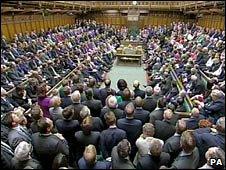MPs prepare for secret ballot for committee chairmen
- Published

The whole House of Commons will be able to take part in the vote
MPs hoping to become chairmen of the influential House of Commons select committees face a secret ballot of colleagues for the first time.
Elections have been brought in for the roles as part of reforms intended to boost MPs' powers via the committees to scrutinise and influence government.
In the past political party bosses have been able to influence the behind-the-scenes appointments.
The elections are due to take place during the course of Wednesday.
The chairman roles have been divided up between parties based on the general election results. Twelve committees are to have a Conservative MP as chairman, Labour MPs will chair 10 and Lib Dem MPs two.
So each of the elections - where there is more than one candidate - will be between MPs from the same party.
Among those standing for re-election are Conservative James Arbuthnot for defence and Labour's Keith Vaz on home affairs.
But at least one new MP, Tory Neil Parish, is also standing for a chairmanship.
'Powerful mandate'
He has the backing of several new MPs elected for the first time last month and will go up against fellow Conservatives James Gray, Stewart Jackson and Anne McIntosh for chairman of the environment, food and rural affairs committee.
Mr Jackson told the BBC the 227 new MPs made up a "significant proportion" of the electorate adding: "Any candidate that dismisses their views and assumes they can get elected by appealing to their comfort zone is making a big mistake."
He said the role of backbenchers would be increased both by the Wright Committee reforms, and the fact there was a coalition government - the secret ballot would give committee chairmen a "quite powerful" mandate to hold the government to account.
Those standing for the roles have been contacting colleagues, setting out how they see the role and their qualifications.
Mr Gray, a former committee member, said it was hard to predict how the new MPs would vote but, with the chairmanship of 24 committees up for grabs, "too much campaigning would be a bit irritating".
Former ministers
However he said the ballot would bring "a degree of true democracy" to the selection process: "It used to be up to the whips and they tended to dole the chairmanships out to people who might otherwise have been disappointed not to be ministers, or something else."
Among others standing so far are Labour MPs Adrian Bailey, Geraint Davies and Barry Sheerman for the business committee and Conservative MPs Christopher Chope, Bernard Jenkin and Ian Liddell-Grainger for the public administration committee.
Some are hoping to retain their chairmanships. Conservative John Whittingdale is standing for re-election for the culture, media and sport committee while Lib Dem Sir Alan Beith is standing again for the justice committee.
And some former ministers are standing - Margaret Hodge for the chairmanship of the influential public accounts committee and Nick Raynsford for communities and local government.
They have to be nominated by 15 MPs, or 10% of MPs from their own party - whichever is lower - to get onto the ballot paper.
Those standing unchallenged will be automatically elected on Wednesday 9 June. Others will be elected using the "alternative vote" system - with MPs ranking their favourites and the first to get more than 50% of votes going through.
Graham Stringer - one of the Labour MPs going for chairmanship of the science and technology committee - said: "I don't think there will be a huge change, I think it will be much more difficult for people to be a minister one minute, finish being a minister then go straight into the chair of a committee."
'Political history'
He does not think the secret ballot of MPs will make a big difference but said it was hard to predict: "It's an electorate that's never been put together and nobody, I think, has any idea what they will do."
And he said it could eventually result in "moments in political history when people who are unpopular with the government are chosen when they might not be the best chair, to send a message to the government at a particular time".
The Independent on Sunday reported there had been an organised campaign by MPs on the right of the Conservative Party to try to secure the most influential chairmanships.
But Michael Fallon, who is a contender for the influential Treasury select committee, told BBC Radio 4's The World This Weekend: "These aren't left-right elections in that sense, the house as a whole is voting for the very first time.. and that means you've got to build support right across your own party but right across the Commons as well."
The Wright committee, set up to propose moves to strengthen the Commons, had criticised the element of "party patronage" involved in appointing MPs to committees.
Its report said it was "unacceptable" that, in the past, the power of the whips had been used to keep MPs considered to be "mavericks" off committees or that they could offer the chairmanship "as a reward or 'consolation prize' to former ministers".
The committee was set up in the wake of the MPs' expenses scandal, with the aim of strengthening the House of Commons.